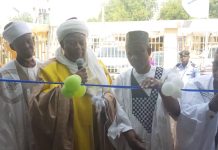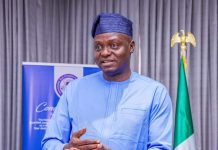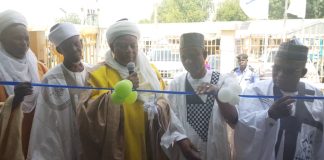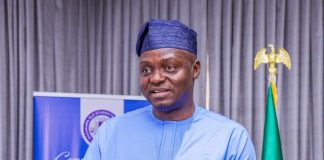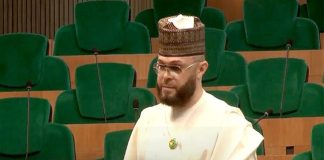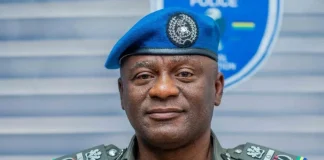🌿 Ruzu Non-Alcoholic Herbal Bitters
Ruzu Non-Alcoholic Herbal Bitters is a natural health supplement specially formulated to:
- ✅ Promote general wellness
- ✅ Detoxify the body
- ✅ Support the treatment of various ailments
Made from a powerful blend of 100% organic and medicinal herbs, Ruzu is completely alcohol-free, making it ideal for:
- 👪 All age groups
- 🌱 Health-conscious individuals
- 🌿 Anyone seeking non-alcoholic herbal remedies
Whether you're looking to boost your vitality, cleanse your system, or support healing the natural way, Ruzu Bitters offers a trusted herbal solution.
By Solomon Semaka
The National Youth Service Corps (NYSC) is now 50 years. It was formed on May 22, 1973, by the military government of Yakubu Gowon through Decree No. 24 which generally provided that the scheme was created with the aim of “encouragement and development of common ties among the youths of Nigeria and the promotion of national unity.”
The specific objectives of the scheme as spelt out later in Decree No.51 of 16 June, 1993 indicate that the National Youth Service Corps was established to inculcate discipline in Nigerian youths by instilling in them a tradition of industry at work, and of patriotic and loyal service to Nigeria in any situation they may find themselves; to raise the moral tone of the Nigerian youths by giving them the opportunity to learn about higher ideals of national achievement, social and cultural improvement; to develop in the Nigerian youths the attitudes of mind, acquired through shared experience and suitable training which will make them more amenable to mobilization in the national interest; to enable Nigerian youths acquire the spirit of self reliance by encouraging them to develop skills for self employment; to contribute to the accelerated growth of the national economy; to develop common ties among the Nigerian youths and promote national unity and integration; to remove prejudices, eliminate ignorance and confirm at first hand the many similarities among Nigerians of all ethnic groups; and to develop a sense of corporate existence and common destiny of the people of Nigeria.
The Service was also created to ensure equitable distribution of members of the service corps and the effective utilization of their skills in areas of national needs; to ensure that, as far as possible, youths are assigned to jobs in States other than their States of origin; to determine such group of youths assigned to work together is as representative of Nigeria as far as possible; to expose the youths to the modes of living of the people in different parts of Nigeria; to encourage the youths to eschew religious intolerance by accommodating religious differences; to encourage corps members to seek at the end of their one-year national service, career employment all over Nigeria, thus promoting the free movement of labour; and to encourage employers partly through their experience with members of the service corps to employ more readily and permanently, qualified Nigerians, irrespective of their States of origin.
Since its inception, graduates of universities and later polytechnics have been mobilized for national service through the scheme for nation-building, community service, and national unity. This has promoted national integration, cohesion, and mutual and peaceful co-existence among the diverse multicultural and multi-religious groups in Nigeria. The NYSC through the Community Development Service and Special Project Department has undertaken projects across towns and villages in Nigeria. With the coming of Brigadier-General Yushau Dogara Ahmed as the new Director-General National Youth Service Corps in January 2023, the scheme is better poised to achieve more.
On the assumption of duty, the Director-General stated that his administration will improve the security, and welfare of corps members and staff to engender optimal service delivery to the nation; provide an enabling environment for Research and Development for the advancement of the scheme; strengthen stakeholders’ engagement for the promotion of the frontiers of the scheme; enhancement of capacity building to stimulate efficiency and higher corporate performance; and deepening the impact of the Skill Acquisition and Entrepreneurship Development (SAED) Programme. With the cooperation of the staff, the new Director-General of the NYSC has built on the progress and landmark achievements recorded by his predecessors.
Only in March 2023, the Director-General constituted a 13-man think-tank committee that would push for the actualization of his policies in office. To achieve maximal results, he charged the committee headed by its chairman, Mr. Omotade Ayodele, NYSC’s Director of Corps Welfare and Health Services, to work in conjunction with the NYSC Area Offices and other structures of the scheme and also liaise with various NYSC stakeholders towards the actualization of the policy trust mandate. The NYSC under his leadership has continued to partner with key stakeholders to expand the NYSC health initiatives and rural development. Drugs and other medical consumables are given by the staff of the scheme during medical and health outreaches to local communities. The aim of this is to complement the desire of the scheme to establish mobile clinics vigorously pursued by the scheme. In addition to the projects being executed by the scheme, corps members are encouraged to carry out critical Community Service Development (CDS) projects in their Place of Primary Assignment (PPA). This is intended to bring succour and alleviate the suffering of the project’s community and users.
The personal safety and security of corps members is his top priority. Incidents of kidnapping, killing, and brutalization of corps members on national duty are almost a thing of the past. Unlike in the past when corps members were attacked during election duty, there are no reported cases of corps members being killed during the last elections. He advises corps members to be good ambassadors of the scheme by eschewing overtures from the political class during election duties. He tells corps members not to compromise their neutrality, but instead work hard to give credibility to every election duty and all other national assignments they are called upon to perform.
Issues of staff welfare occupy a strategic position on the agenda of the new Director-General. He knows the critical role of the management and staff of the scheme, and he is willing to ensure that they are highly motivated to discharge their duties. Just as the Director-General ensures prompt payment of wages, salaries, and other emoluments of their staff, staff who exhibit exceptional and exemplary leadership skills in their line of duty stand a chance to be rewarded by the Director-General.
The Director-General is a man who is open to advice and constructive criticism. He believes that a tree does not make a forest. He believes in teamwork. He is a great team player. By inaugurating his think-tank committee a few weeks in office, he has demonstrated that he does not know all nor does he have all the solutions to the problems of the scheme. Yet, by carrying everyone along, he has shown that every problem of the scheme will be solved by teamwork. Team spirit is one of the scarce ingredients of modern leadership. For a scheme like the NYSC, however, it is highly needed to surmount the challenges.
The major problem facing the scheme is underfunding. Despite the annual budgetary provisions made for the scheme, the inability to have a complete list of graduates from the institutions on time often affects NYSC’s planning activities. This creates a situation where not all graduates from all the schools are mobilized at the same time. The growing number of graduates participating in the scheme has led to a situation where many employers reject corps members at will and those who are taken are sometimes not paid a token by places of primary assignment to augment their monthly federal allowance. The rising incidents of kidnapping and state of insecurity pose a serious problem for the personal safety and security of corps members. The high cost of items across the country has drastically reduced the purchasing power of corps members, thereby defeating the aim of the Buhari government to raise the allowance of the corps members recently. Yet, the Buhari administration should be applauded for not yielding to the calls by some sections of the country to scrap the scheme. Agreed: the scheme needs to be reformed to make it more relevant and competitive to the changing times. Sure, it does not need to be scrapped for the needed change to be effected.
The NYSC is one of the surviving national legacies of our dear country. It is a symbol of our national unity and collective struggle to remain as one people with a common destiny. It provides a stop-gap for the youths to learn from the multicultural, multilingual, and multi-religious diversity of the country. It provides a learning process for corps members. It creates a temporary employment shelter for corps members before they find a more permanent job after the service. Marriage among corps members is on the increase. Just as most corps members prefer to stay back in their state of deployment to raise a family, many become so integrated into their new “homes” after the service year. As a result of this, many graduating students look up to the service year with hopes and dreams. These dreams and aspirations should not be jettisoned by the loud forces of disintegration. And now, with Brigadier-General Yushau Dogara Ahmed in the saddle, there are better days for the scheme ahead.
Solomon Semaka is the Convener of Save Nigeria Movement


